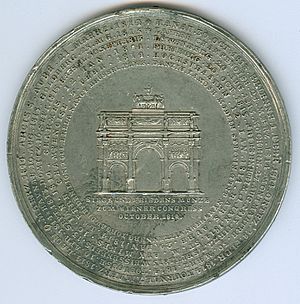Battle of Hoogstraten facts for kids
Quick facts for kids Battle of Hoogstraten |
|||||||
|---|---|---|---|---|---|---|---|
| Part of the War of the Sixth Coalition | |||||||
 Medal made for the Congress of Vienna in October 1813, including the Battle of Hoogstraten |
|||||||
|
|||||||
| Belligerents | |||||||
| Commanders and leaders | |||||||
| Strength | |||||||
| 10,000 | 12,000 | ||||||
| Casualties and losses | |||||||
| 300-747 killed or wounded 216-500 captured |
465-500 killed or wounded | ||||||
The Battle of Hoogstraten was a fight that happened on January 11, 1814. It was part of a bigger conflict called the War of the Sixth Coalition. In this battle, a French army fought against a combined army from Prussia, Russia, and Britain.
The battle took place in what is now Belgium, near the town of Hoogstraten. The fighting spread across several towns. In the end, the Prussian-led forces won the battle.
Contents
Why the Battle Happened
After a huge battle called the battle of Leipzig, the French army had to retreat. Other European countries, known as the Allies, then moved into areas controlled by France. These areas included the Low Countries, which are now Belgium and the Netherlands.
In December 1813, the French leader Emperor Napoleon sent troops to take back the town of Breda. This town had sided with the Allies. After three days, the French couldn't capture Breda and pulled back. They gathered their forces around Hoogstraten.
On January 11, 1814, the Allies started a new attack. They moved from Breda towards Antwerp. Their goal was to capture the important Port of Antwerp. This led to the Battle of Hoogstraten.
Who Fought in the Battle
The two sides in the battle were the French army and the Allied army.
The Allied Forces
The Allied army was made up of soldiers from different countries:
- Prussia: The main part was the III Prussian Corps, led by Friedrich von Bülow. This included three brigades of infantry (foot soldiers) and three brigades of cavalry (horse soldiers).
- Russia: A group of Russian soldiers, led by Ferdinand von Wintzingerode, also joined the Prussians.
- Britain: The British Expeditionary Corps was led by Thomas Graham. This group had two divisions of soldiers.
The French Forces
The French army was led by François Roguet. It included:
- A division of young, elite soldiers called the Young Guard.
- A regular infantry division.
- A cavalry division, also from the Young Guard.
How the Battle Unfolded
On January 11, 1814, the Allied forces began their attack.
- Three Prussian brigades attacked a long line of French positions.
- The British soldiers supported the Prussians on their right side. They marched towards Antwerp.
- A snowstorm made fighting difficult.
- About 15,000 Allied soldiers attacked around 6,000 French troops.
- There was heavy fighting in several towns, including Wuustwezel, Loenhout, Wortel, Minderhout, and Hoogstraten.
- Around 2 PM, Hoogstraten was captured by the Prussians.
- Fighting continued into the night in other towns.
- The French commander, Roguet, managed to pull his troops back safely. They retreated to Antwerp.
What Happened After the Battle
The Battle of Hoogstraten was a victory for the Allies.
- The Prussians lost about 465 soldiers.
- The French lost more, with 747 soldiers killed or wounded. Another 216 to 500 French soldiers were captured. This meant the French lost a large part of their army.
After the French retreated to Antwerp, the Allies started a siege of the city. The French, led by Lazare Carnot, held out in Antwerp for a long time. They only gave up the city in May 1814, after Napoleon had given up his power.
 | Aurelia Browder |
 | Nannie Helen Burroughs |
 | Michelle Alexander |

